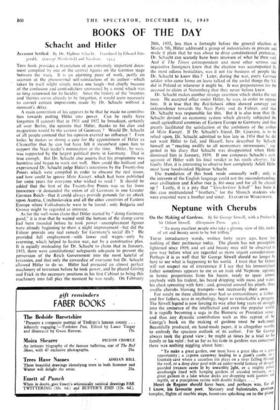BOOKS OF THE DAY
Schacht and Hitler
Account Settled. II) Dr. Hjalmar sk hada. 1 ranslated by Edward Fitz- gerald. (George Weidetileld and Nitokon. t Ss.)
Tins book provides a translation of an extremely important docu- ment compiled by one of the central figures on the German stage between the wars. It is an alarming piece of work, partly on account of the phenomenal self-satisfaction of its author—which taken by itself might simply make one laugh—but chiefly because of the confusion and contradiction sponsored by a mind which was so long renowned for its lucidity Since the history of the 'twenties and 'thirties seems already to he forgotten, it would seem necessary to correct certain impressions made by Dr. Schacht without a moment's delay.
A main contention of his appears to be that he made no contribu- tion towards putting Hitler into power. Can he really have forgotten (1 cannot) that in 1931 and 1932 he broadcast, certainly all over Berlin, the opinion that Hitler, thanks to his flan and magnetism would be the saviour of Germany ? Would Dr. Schacht of all people contend that his opinion exerted no influence ? Even today he makes so strong a case for the appointment of Hitler as Chancellor that he can but have felt it incumbent upon him to support the Nazi leader's nomination at the time. Hitler, he says, was supported by the largest political party in Germany. That is true enough. But Dr. Schacht also asserts that his programme was harmless and began to work out well. How could the brilliant and experienced Dr. Schacht judge Hitler's intentions by the Twenty-live Points which were compiled in order to obscure the real issues, and how could he ignore Mein Kampf. which had been published for some years for everyone who wished to read ? It should be added that the first of the Twenty-five Points was so far from innocence—it demanded the union of all Germans in one Greater German Reich—that it could always provide grounds for an attack upon Austria, Czechoslovakia and all the other countries of Eastern !Europe where Valksdeutsche were to be found ; only Bulgaria and Greece might he regarded as immune.
As for the well-worn claim that Hitler started by " doing Germany good," it is true that he waited until the bottom of the slump curve had been rounded before he took power--unemployment figures were already beginning to show a slight improvement—but did the Fiihrer provide any real remedy for Germany's social ills ? He provided full employment—with lower real wages—only by rearming, which helped to hasten war, not by a constructive plan. It is equally misleading for Dr. Schacht to claim that in January, 1933, there were constitutional safeguards adequate to prevent the perversion of the Reich Government into the most hateful of tyrannies. and that only the cowardice of everyone but Dr. Schacht allowed Hitler to do so. Hitler had prepared an almost perfect machinery of terrorism before he took power, and he placed Goring and Frick in the necessary positions in his first Cabinet to bring this machinery into full play the moment he was ready. On February 20th, 1933, less than a fortnight before the general election of March 5th, Hitler addressed a group of industrialists in private and
made it plain that he was about to drop constitutional pretences: Dr. Schacht can scarcely have been unaware of what he then said. And if The Times correspondent and most other serious and inquisitive foreigners knew that the election was accompanied by the most odious bestialities, was it not the business of people like Dr. Schacht to know this ? Later, during the war, every German
soldier who came home on leave talked of the awful things the SS. did in Poland or wherever it might be. It was preposterous for the accused to claim at Nuremberg that they never before knew.
Dr. Schacht makes another strange assertion which shirks the real issue. He accepted office under Hitler. he says, in order to oppose him. It is true that the Reichsbank often showed courage and independence towards the Nazi Party and its Fiffirer, and that Dr. Schacht was responsible for this. But it is also true that Dr. Schacht devised an economic system which cleverly subjected the small agricultural countries of Eastern Europe to Germany and thus greatly facilitated the satisfaction of the ambitions of the author of Mein Kampf. If Dr. Schacht's friend, Dr. Gisevitts, is to be relied upon, Dr. Schacht admitted to him late in 1934 that he did not want Hitler to fail, and Hassell, here described by Schacht himself as " reacting swiftly to all momentary imnressions." sup gested in his diary that Schacht was disappointed when Hitler dismissed him in January, 1939. If one compares Schacht's early account of Hitler with his final verdict in his ninth chapter. The Gaily Man, it is interesting to observe how completely Adolf Hitler must have hoodwinked Hjalmar Schacht.
The translation of this book reads 'unusually well ; only in the interests of the English language could not the inisundertanding, over civilisation and Kultur (see p. 86) once and for all be cleared up ? Lastly, it is a pity that "Geschwisier Scholl- has been in this case mistranslated " brothers," for the Munich students v.h, were executed were a brother and sister. ELIZABETII WISKEMA\'.


































 Previous page
Previous page